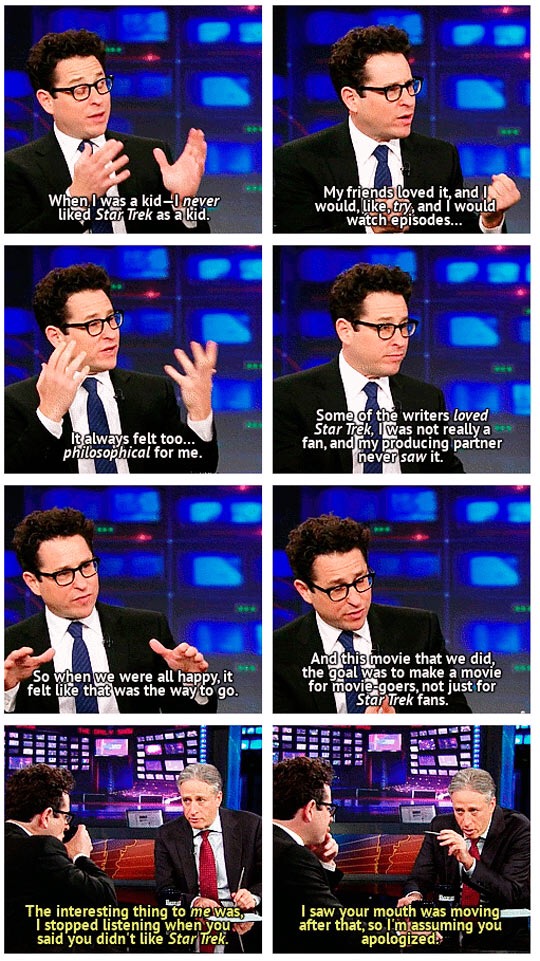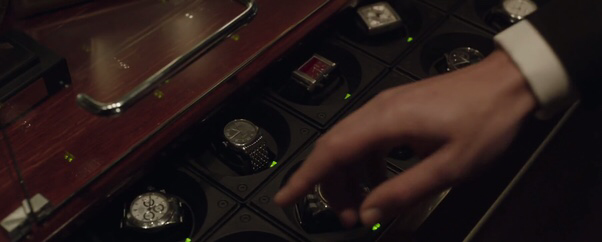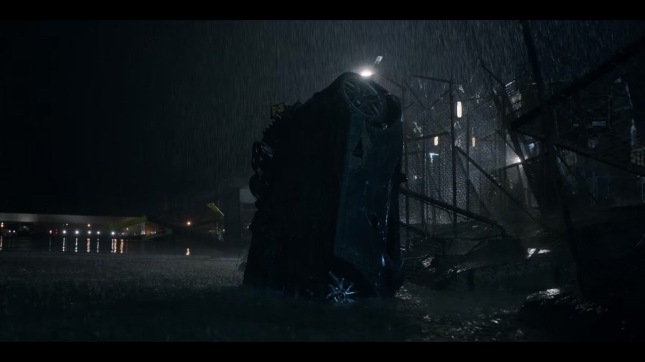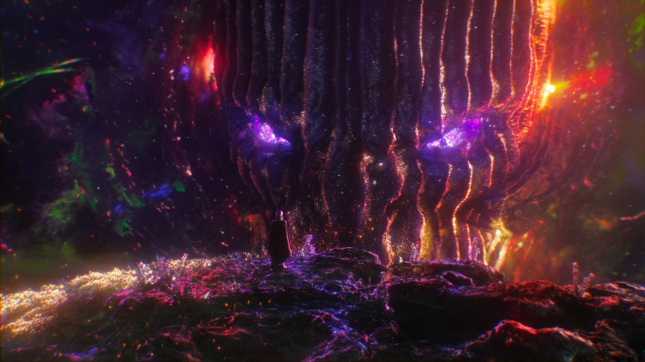Some T.V. shows are cancelled before their time, some go on too long, some should never have been made, and some lucky few actually have an ending, and some of those few are even luckier to have a good ending. Everyone has that one show they loved that they wish was still on the air, the one they wish had never been made, and the one they wish hadn’t gone off the rails. I’d like to examine some shows I’ve watched and explain why they should, shouldn’t have, or were cancelled. So Spoilers!
Running Past the Finish Line, Way Past: Supernatural

This is the only show on this list still on the air, and therein lies the problem. Supernatural is a great show. It’s funny, heartbreaking, dynamic, epic, and totally worth watching. However, of late, there have been some great stinkers of episodes. Such as, in season nine when they introduce Oz into the mythos. What was with those ruby slippers? I could find better quality shoes at Payless. Don’t get me wrong. There have been some great moments still. Timothy Olmundson is just amazing in any part he plays. I mean, look how angry he is. Every moment, even when calm, he looks like he will murder everyone around.

But a lot of recent episodes are poorly written and some lack good research, such as Artemis, goddess of hunters and virgins, having had a lover. Do they know nothing of Greek mythology? The only reason the show is still watchable at this point is the actors and the characters they play. Ackles, Padalecki, Collins, and Sheppard still bring their all to the show, making their interplay still really fun to watch. The characters are still dynamic. However, if you watch the entirety of the show over a roughly single sitting (not truly possible, but watch them all in a row stopping for sleep and work), you’ll notice some weird cyclical character developments:
- Sam’s done something bad or thinks he’s evil, Dean’s mad at him, Sam tries something drastic to make up for it: Sam drinks demon blood, tries to kill Lilith; Sam frees Lucifer, quits hunting/sacrifices himself to the cage; Sam thinks he’s just b-b-b-bad to the bone, does the trials to close the gates of hell.
- Dean tries to sacrifice himself for the greater good/Sam because he doesn’t believe he is worth saving: Dean sells his soul; Dean wants to do the trials; Dean takes the first blade. (1 & 2 are what I like to call: One of the Winchesters is trying to dive off a bridge.)
- Sam wants out of the life, tries to help others stay out, Dean tells him it’s impossible: The many freaking times Sam has quit.
- Dean tries to help others stay out, Sam tells him it’s impossible: Speaking to Adam about the life. (3 & 4 are The Godfather Part III: “Everytime I try to get out, they pull me back in!”)
- Cas does something he thinks is for the greater good, Dean gets mad at him: Betraying the Winchesters for the Angels (which time am I referring to?), Working with Crowley, Staying behind in Purgatory, Working for Hannah (even if brainwashed).
- Crowley is their friend: During the Apocalypse, Against Abaddon.
- Crowley is their enemy: During the fight for Purgatory, During the trials. (6 & 7 are essentially the daisy game: He likes me, He doesn’t like me, He likes me . . .)
- Dean thinks all monsters deserve to die, Sam argues otherwise: the good vampires episode (also the introduction of Gordon), Ruby (though he is right about this one), the episode with Jewel State (the kitsunke).
- Sam thinks all monsters deserve to die, Dean argues otherwise: Crowley (Sam never trusts him) and Dean thinks they should work with him, when Sam meets Benny. (8 & 9 are the dumbest flip flops on the show).
Some of these are paired together because they show a switch of positions, but all of them happen at least twice in the show. But why do all these pop up again and again? Well, that easy. They’ve run out of ideas to make the characters grow and create conflict. Why? Also easy. Season Five was the real conclusion of the show. Armageddon was stopped, Sam made up for his most drastic mistake, and Dean lived out a happy life with Lisa and Ben. The end. No more. But the show was too good and too profitable to stop there. I totally don’t blame them for continuing the show, a big part of me is glad they did. I love this show. But I can’t deny as a writer that the complete (cannonical) piece is just five seasons. This is why we get some pretty crappy episodes and cyclical character development. Because the characters and the actors are so good, Supernatural is doomed to repeat the same developments over and over again until one of the major actors quits. No major plot development can compare to ending the Armageddon. It’s basically impossible. Also impossible is continuing dramatic conflict with having your characters actually, permanently learn from their mistakes (sounds like the opposite of a soap opera). Like that’s ever going to happen, Looking at you Cas!
Tripped Mid-stride: Lost

This is the juggernaut of the list. Critically acclaimed. Loved by nearly all. I was patently uninterested when it was airing, because I refuse to watch shows one episode per week, especially when they are as confusing and complex as Lost. Everyone was telling me I should watch it, but I held off until it was over and on Netflix in it’s entirety. Then I tried watching it. I got bored, really bored, mid season six and about a year or two later, tried coming back to it. I started where I left off, had no idea what was going on, so I went back to the beginning of the season. I was still completely lost, so I went back to the beginning of the show. I watched it all in a row. (Unfortunately, someone else was sometimes in the room saying things like “Oh-kay”, “Aaall right”, and “What the fuck?” every time something weird or dramatic happened, which is freaking always!) This is a great show. It has a great story. It has great characters. It should not have been six seasons long. It should not have had so many character groups. Half the watching time is trying to remember who the hell this or that person is. For example, we have the fuselage passengers (or main characters), we have the Others (who by the way are never explained as how and why they are on the island), we have the tail section passengers, we have the Widmore mercenaries, we have the Dharma Initiative members, and we have the Ajira flight passengers. And that doesn’t include people from the past who are meaningful to the main characters, Desmond, Daniel Faraday’s mother, Rousseau (and the original members of her team), Richard Alpert, Jacob, the Man in Black, their mother, their real mother and her people, the past Others. THIS IS TOO MUCH. When Illana was introduced in season six, along with her crew, all I could think is “I. DON’T. CARE.” But this is just a problem of trying to create an opus of a T.V. show. The real problem is the weird floundering that happen halfway through the show when the Writer’s Strike happened.
J.J. Abrams and crew all quit writing for the show and took to the picket lines. While this ultimately was good for T.V. writers and writing, it was not good for Lost. Why? Writing a specific piece is about being in a specific mood for that work. It’s hard to sustain creative motion after stopping. Sometimes one can get back into that mood by re-experiencing the progress so far. However, sometimes the work is too big and too deep to get back into that mood. And T.V. shows have added constraints of compromises with the studios that produce them. Which is why Annie (can you possibly remember this character without me showing you a picture?) is dropped like a bad habit in Lost. It is why the dark versus light foreshadowing of the first season is not brought up again until season six, which most viewers would have forgotten in the first place, but is the main point of the show. Instead of getting bogged down in what stupid thing Locke is doing now or what contrary and stubborn thing Jack is doing now, we should have been reaching more main point stuff much earlier on. Season Six: Oh, you remember those caves from season one? No, here they are. Remember those bodies and the stones in the cave? No, here they are. Now we can show you Jacob’s origin, since you forgot all that stuff long ago (even if you watched it all within one month, let alone the six years it was on the air).
There is some great character development in Lost though. Locke desperately wants his faith affirmed, Jack will say no just because someone asked, Kate will run away, Sawyer will sabotage any interpersonal relationships, and everyone loves Hurley, because duh. But eventually, Locke realizes his affirmation of faith is not as important as people, Jack says yes because he believes, Kate stops running, Sawyer can have a stable relationship, and everyone still loves Hurley, because duh, but also Hurley doesn’t think he’s crazy or cursed anymore. So watch it, but be prepared for some missteps (the whispers are the Others as confirmed by Ben when he takes Alex from Rousseau–No, wait, we meant the whispers are the sounds of the people who died on the island who can’t move on as confirmed by Michael when he speaks to Hurley as a ghost) and some dragging.
Crappy Equipment: Eureka

Eureka is one of my all time favorite shows. It was just so funny. But it only has five seasons. I’d say this is the best amount, because there was a chance for Eureka to have a season six of six episodes but their budget was being pulled by Comcast. The creator and producers decided instead of doing six really crappy episodes, they would use the much smaller budget to create a finale to the show. Bless their hearts, because I’d rather have a conclusion to the show than have six badly made episodes wherein we get no closure afterwards. It sucks that the show had it’s budget dramatically reduced, but to some extent this is because viewership started to drop off.
This happens for three reasons in our current television age: 1) the channel keeps changing the time/day on which the show is aired, 2) the channel does not advertise new season premiers enough, 3) viewership is calculated through ratings which do not take into account online viewing on the channel website or paid streaming services such as Amazon Video, Amazon Prime, Hulu, Hulu Plus, or Netflix. The first two are totally Sy-Fy’s fault, and they did do these. I remember Eureka was changed to Tuesdays from Fridays between two seasons, and I missed the premiers of new seasons of all their shows because I never heard about them until after the fact. Sy-Fy, when I was watching cable or satellite T.V., has a tendency to not advertise new seasons enough or evenly across all shows and over advertises new episodes of currently airing shows, which is usually when I found out a new season had premiered. The third one is because ratings, and studios by extension, have not caught up to the changing technology of viewership. I have left the ratings count completely, and I’m sure there are a lot of other people who have too. Which means studios need to get with the program and stop defunding shows that possibly have higher viewership than they are currently willing to count. How people watch T.V. is changing rapidly, and no matter how many stupid mail flyers Cox, Dish, or Direct T.V. send me, I am not going to pay $150-$300 to have annoying ads most of the time, censored/truncated content, inconvenient air times, and channels I will never use (Looking at you, CSPAN and ESPN!).
But back to Eureka: a show losing it’s budget is a good reason to just close up shop. Some may disagree with me and want as many episodes as possible, even if they suck. But I’m no fanboy. I want the story and the production to be of quality, so I’d rather have shows do what Eureka did than have them flounder out weak, shoddy episodes. This is a case of quality over quantity. I miss Eureka, but I consider it, for what it is, to be nearly perfectly done (one major misstep, read further below). It had a formula that it stuck to, but the characters grew and their lives changed. I’m glad it exists and will always treasure it.
Fell Face First Right Out the Gate: Charmed
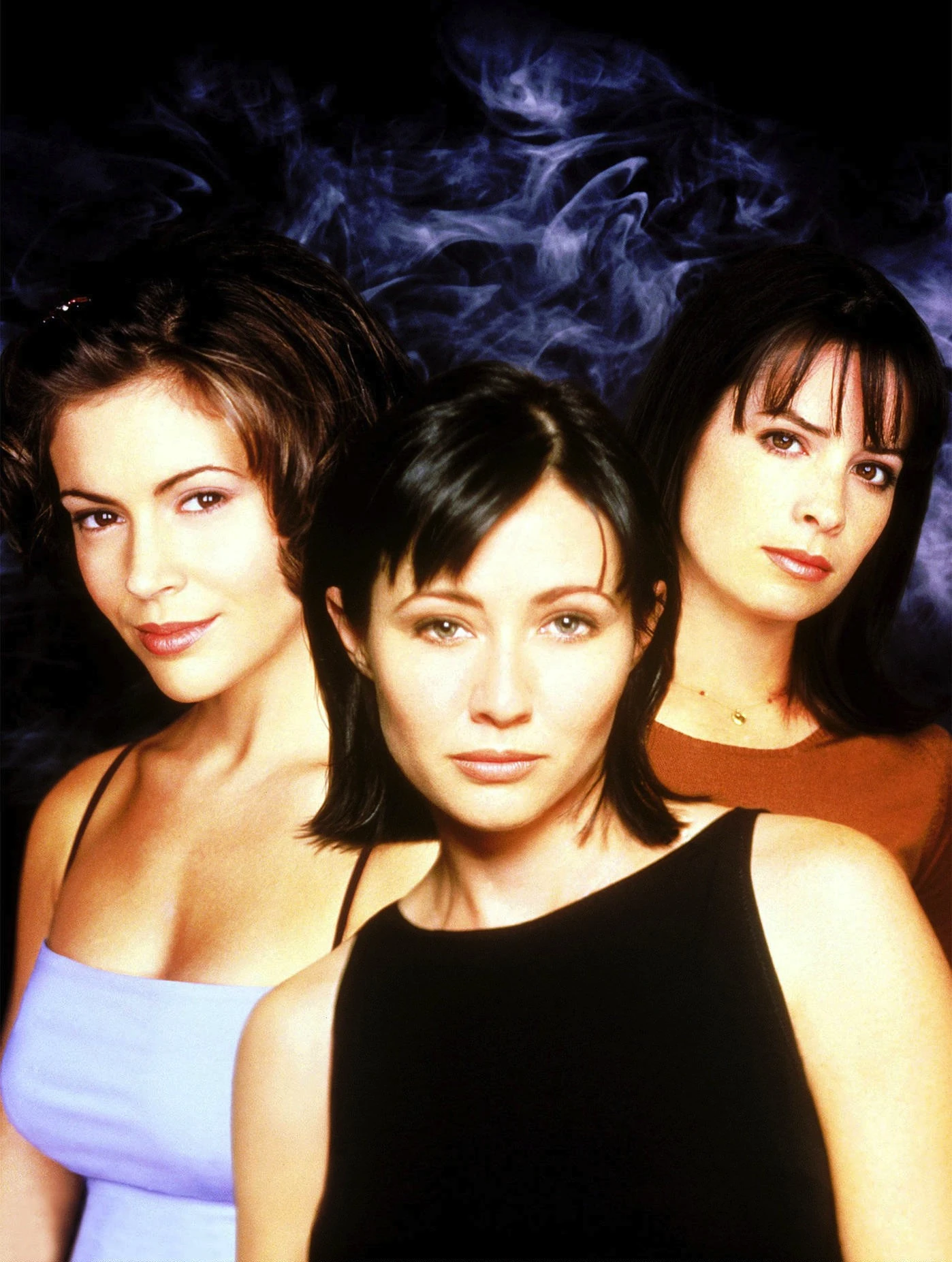
I watched a couple of seasons of Charmed, and to be honest, I’m not sure why it lasted as long as it did. Frankly, I’m surprised it made it past the pilot stage. There are a couple of shows that are awful from the very start: the production is low quality, the writing is passe, unrealistic, or lazy, the acting is phoned in. This is one of those shows. Some people love that show. I’m not sure why. The one good actor on it, Julian McMahon, didn’t have much to work with. Shannen Doherty was unwatchable. And the rest of the actors were pretty green. Other shows like this include Roswell (Twilight anyone? You know before Twilight was written) and Bones. I like Bones, but I like David Boreanaz and Emily Deschanel, so maybe that’s the only way shows like this work.
One of the worst things Charmed ever did was shoehorning in the night club wherein a different flavor of the month band would play every other episode. They did this on T.V. shows a lot in the nineties, and every once in a while a show will try it again, Bones again. Thank you for wasting two to five minutes of each episode to a band no one cares about anymore or maybe even by the time the episode aired, instead of, you know, spending the time resolving the plot in a meaningful and acceptable way, instead of going “We need to tie a bow on this, got to get to the band scene!” This is a bad idea. Don’t do it. Most shows are cutting out theme songs and actor shots (ala Lost style) to save that time too. Don’t waste even more time than that on a stupid band I couldn’t name two seconds after you announced it.
On shoddy production, Charmed takes the cake, and sets it on fire. Almost all of the show is shot in about two locations, which could be fine, but the real problem comes with the special effects quality and the monster creation. It’s certain they didn’t spend any of their budget on writing, but with how the show looks, one wonders where the money went. I could say something catty about the actors, but I’m going to refrain because the joke lacks any truth, I imagine. Shows of the nineties, and Supernatural, have an annoying habit of having monsters and aliens just be people, more times than necessary professional wrestlers specifically, wearing weird makeup, latex, and/or contacts. Never is it something completely inhuman. They’re all upright bipeds with two arms and basic facial features. Sometimes, the show just says they’re something inhuman, which is only displayed by powers (ala the dragons and phoenix from Supernatural–why not show us what the freaking dragons looked like picking up a chick? Because now I just picture that guy doing it in cargo pants and a zippered jacket. Not very exiting.). This is the sign of a low budget, or a budget that isn’t valuing creating the world. I gave Farscape a pass on this because Jim Hensen’s Workshop did Rigel and Pilot, and those were awesome concepts, but Star Trek (all of them, even the recent movies), Charmed, and Supernatural display a complete lack of imagination when it comes to showing us crazy, different forms of life. I’m not saying every monster needed to be something totally different, but at least the ones that are traditionally so and a few every once in a while. If Buffy can do it (ala the mantis from season one), so could they. Charmed was the most pathetic when it came to showing us interesting monsters. Oooh, Cole really looks like a WWE member with red and black makeup on. How intriguing.
Charmed really never should have been made. It didn’t really have anything going for it, and I watched a couple of seasons, so you can’t say that it was the season one growing period. There just wasn’t anything there of substance or quality. Maybe it was made and sustained entirely on girl power, which just makes it all the more insulting to the discerning viewer. I’m all for strong women kicking butt, but this show was more about showcasing “sexy” women’s butts (Milano & McGowan are sexy) and telling us they were strong. It was a relief beyond measure when Doherty was no longer on the show, like when someone gives you morphine after you’ve been stabbed, but it’s not like the show got all that better afterwards, what with that stupid elusive enemy of The Source. The Source of What?!
Lost a Shoe in the Middle of the Race: House, M.D. and Two and a Half Men
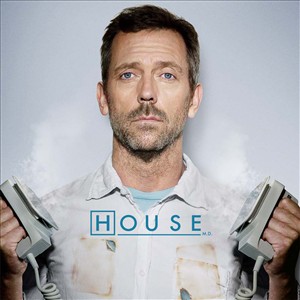
The cast of a show is as important as its writing. Writing is limited by what actor is available after a certain point in a show’s lifetime. Bewitched lost the original Darren, Dick York, but replaced him with Dick Sargent, when they really should have just cancelled the show. Eureka lost Ed Quinn. Lost lost Adewale Akinnuoye-Agbaje (wow). Charmed let Shannen Doherty go. Misfits lost Lauren Socha. Two and Half Men dropped Charlie Sheen, and House, M.D. lost Kal Penn to politics and Lisa Edlestein possibly over her not wanting to take a pay cut. Actors leave T.V. shows for many reasons: they get sick, they want to do other projects, they get sick of the show, they get arrested, the show gets sick of them, or they argue over money (match ’em up). But this affects what the show can do. They can replace the actor as in Bewitched, which sucked after the change. They can write a goodbye episode, wherein the actor is still used, as in Eureka, Lost, or Charmed. They can write the character out of the story after the actor is gone, as in both cases of House, M.D. Or if the actor they lost was a main character, they can try to desperately hold on to the structure of the show around a new character, as in Two and a Half Men.
Some think that Kutner got a goodbye episode in House, M.D., but a goodbye episode requires the actor be there, which is why when Kutner dies, it is completely out of left field and the writers are trying to salvage the situation. I’m not sure why Penn didn’t stick around for at least a goodbye episode considering how he appeared on the show at least two more times after his character’s death. It was, however, quite clear that Edlestein was done with the show completely once she left it, but it seems her leaving had more of an impact. Possibly because the main dynamic of that show is House, Wilson, Cuddy, and Team (which can change without too much impact because of the other three). Some believe the show unfinished because Cuddy wasn’t at House’s funeral and feel that the House/Cuddy question was never resolved. While stuck with the fact that they could not include Cuddy because the actress would not take part or because they did not wish to work with her, the question can be pretty well resolved within the story of the show. She wasn’t at his funeral. She left the hospital. She obviously didn’t want anything more to do with him. There’s your answer. Maybe it wasn’t the one you wanted, but it is still an answer. If you want your answer, try to imagine House five months after the end of the show. Maybe he killed himself. Or maybe he went and found Cuddy and apologized for all he did, and she took him back. We don’t know. But the show lost something when it lost Edlestein. The interplay between House and Cuddy was very interesting, but the show took a major misstep when it broke them up over his relapse, especially considering that he was contemplating relapsing when they got together and she told him it was his choice. It’s like they weren’t watching their own show. I do not blame the writers for concluding the show at that point. It was a pretty good conclusion, but I wish they hadn’t introduced two new characters in the last season, because like Lost it was too late in the show to make anyone care.

We all remember that Charlie Sheen kind of went off the deep end a few years back. As a result, his presence on Two and Half Men was no longer a good idea. Nor was the continuation of the show. By that point, the show had gotten boringly cyclical: Charlie sleeps around, he meets a serious woman whom he considers a serious relationship with, he’s in a serious relationship with her, he messes up the relationship and it ends, he sleeps around, he meets a serious woman whom . . . and so on and on until Sheen was no longer on the show. I’m not sure why people kept watching it after three seasons, but I’m especially not sure why the writers and studio decided to continue the show after he was gone or why anyone kept watching it. Maybe to see how bad it got. I’d understand that. If in season five of House, M.D., Hugh Laurie quit the show, I wouldn’t have expected them to continue the show. Nor would I in shows that don’t involve a title character but a main one, such as Quantum Leap, Supernatural, or Eureka. I can’t imagine what would happen if these shows lost Scott Bacula, either of the JSquared, or Colin Ferguson, and decided to keep going. That just seems crazy. Some shows are built around a single actor, and sorry to the other One and Half Men, but Sheen was the main character. It seems like the show, that already wasn’t that good, was a wash at this point and should have been cancelled instead of calling in Ashton Kutcher to try to take his place in some strange way. Sorry to those fans out there, it hurts but the truth often does.
Tripped End Over End and Ate Dirt: Heroes

I watched Heroes religiously when it premiered. I loved it. I loved Mondays because of it. Every episode was a treat. The conclusion of season one was a bit of a letdown, just wasn’t as climatic as it should have been. Season two premiered, and I eagerly watched. That wasn’t all that awesome. Season three I watched on Netflix, and that was awful, and then I stopped watching halfway through that season. What happened? How could it all go so horribly wrong? I’m not entirely sure. I can’t remember another show that fell apart quite so badly, to the point where the show became a punchline on The Big Bang Theory (“They lowered the quality season by season until we were glad it was cancelled.”) I haven’t done a lot of research into this phenomenon, but when something like this happens it can usually be because of one of three reasons: 1) The main creative force left the show, 2) The main creative force has run out of ideas, or 3) The studio has a different idea for the show than the main creative force. Either way the quality of the episode stories decline rapidly as a result of a loss of focus. I’m still really surprised by how bad this show got, especially when it started out so good. For example, Peter left his Irish girlfriend in a horrific future and never mentioned her again! That’s insane. The writers forgot about her? Didn’t care about her? The studio wanted to drop that storyline? What? Tell me. If you have some backstory on this, I’d like to know it. Another example of bad writing is when Sylar kind of becomes a good guy, at least he’s not killing the other heroes. He’s traveling around with Elle and is kind of at peace. That is until suddenly and out of no where he decides that he’s still a bad person and kills her. There isn’t really any impetus for this decision. He just does it. We saw him develop into a less evil person and then suddenly for no reason he decides to go back to his old ways. I think maybe people were unhappy with the turn that Sylar’s character took, or maybe the studio blamed the decline in viewership on the turn, so they told the writers to make him evil again, and because this change didn’t happen organically like the first development, it was done poorly. The show only gets worse from there. Don’t know how I feel about the upcoming Reborn series.
Took It Way Too Seriously: Warehouse 13

This show was always pretty campy. It was very silly, which is why to some extent it made sense as being part of the same world as Eureka but not so much Alphas. The villains were always rather cartoony and the artifacts were often silly. That’s not to say that the characters didn’t have problems or that the plots didn’t go to darker places. In one season conclusion/season premier, all hope in the world is destroyed, one of the agents is stuck in a cell just big enough for her body, and another agent is shot. But that all seemed to be a progression of the plots already related to the warehouse. What wasn’t a progression was Myka getting ovarian cancer. It had nothing to do with stopping villains or the warehouse. She just got cancer. As people do. But the show was silly to begin with, so bringing in this very heavy real world issue seems to be a big ole damper on the viewer’s fun. We understand that people get cancer, but they shouldn’t on a show where a man switched brains with a dog. That’s just incongruous. The show was cancelled before the thrilling conclusion to if Myka was okay or not, then returned for a final season to conclude it. I haven’t watched this last season yet because it’s not on Netflix, but I can’t image that the tone is repaired after such an out of character conflict. It’s very important that a show stick to the tone it started with; otherwise, viewership is lost. I don’t expect a laugh riot with Lost, but I did with Warehouse 13 (especially with the hilarious Christmas episodes).
Decided to Run Back and a Lap and Try It Again: Fringe and Eureka

These two shows are both hour long sci-fi stories, but that is where the similarities end. Fringe was a serious police drama as well, while Eureka was a small town comedy (the theme song said it all; Andy Griffith meets The X-Files). However, because they are both sci-fi, they both made a drastic mistake, one I hope all sci-fi shows learn from: Timeline Shifts. Now, this is okay in one episode wherein everything is back to normal at the end of the episode, such as the conclusion of season one of Eureka. But it becomes a major problem when those changes are permanent. Eureka and Fringe both did this at the beginning of season four. In Eureka, several things changed. Allison wasn’t head of GD, Fargo was head of GD, Lupo was head of security for GD (who did this before?), Zane was still an ass, Henry was married, and Kevin was no longer autistic. Those are the changes that were made obvious to audiences immediately. Questions, though, were left up in the air, because everything we knew happened didn’t. Was the artifact ever at GD? Did it go in Kevin? Did Nathan still die? Did Kim still die? Etc, etc. We have no idea what all happened in the past. If it happened as we saw it on the show or if it happened in an entirely different manner. Obviously, it was different. And we didn’t see it happen. That’s frustrating.
Fringe did the exact same thing, and we had to question even more when the change was that Peter died as little boy. How did Olivia get to see Walter when they said only family could see him? Peter is how she got to him in the first place. Half the problems on Fringe in the first three seasons are solved because of Peter, so now the audience has to question the outcome of all the past cases. Olivia went to the other universe to get Peter back and that’s when Fauxliva becomes a part of the story, so why in the new timeline did she still replace Olivia when Olivia had no reason to go to the other universe in the first freaking place because Peter didn’t exist? Then Olivia remembers everything as we do, and that just makes everything more confusing. I have no clue what happened in the timeline of the first three seasons of the show as the characters know it, so I can’t help but feel like the show is worthless at that point. My impetus to watch dropped dramatically in season four and disappeared almost entirely by the time I reached season five. You can see why voiding everything the viewer knows up to this point is a bad idea. It leaves too many questions that are almost never resolved and makes the viewer feel as if their time has been wasted.
Trying to Teleport down the Track: Fringe

I wrote above that season five of this show left me basically devoid of any reason to watch it and that is the other time pitfall shows tend to fall into: jumping into the future. I don’t mind a quick jaunt into the future (the episode before the conclusion of season three is a good example) or months or maybe a year tops into the future, but anything more than that makes me question the writing of a show. Fringe first jumped into the future in season four episode nineteen, and it ruined all tension of the season four plotline. Gee, do they stop Bell? Well, I don’t know. The earth was still there in episode nineteen, so I guess so. Thanks. They tried to not give away what happens to Olivia at the season four conclusion, so that still had some surprise to it, but the major dramatic question (Will Bell succeed/Will they win?) was resolved before the climax by that stupid episode. Then we have the huge jump in time between season four and five. Why do those decades destroy the show? Mostly, it makes viewers feel like they are missing out on stories, it creates a need for flashbacks (which lets face it, if the show wasn’t already utilizing those, it’s a bit late to be adding them in) which are typically not as active and therefore interesting as current scenes, and puts your characters on development ice. Now for some of the years, they were frozen in amber, but for some they weren’t, wherein we would imagine the characters went through some growth as per usual. The most important development we missed out on is probably the Observers decision to invade. I mean, that’s huge. Now, they tell us why they invade, but since these characters were already pretty central to the show, we needed to see their point of decision. The loss of this moment due to the time jump makes their actions seem completely out of character after the invasion and the invasion itself is questionable at this point. Time jumps leave far too many questions and a feeling of having missed major events in our characters’ lives.
Mimicking Another Runner: The Event, Flashforward, Insert-Lost-Copy-Name-Here

Lost really isn’t the first show like itself (that sounds really strange). Instead, I can name The 4400 as the first otherworldly mystery dramatic epic (that’s a lot of adjectives, but that is pretty much the best description of Lost, its fore-bearers, and successors). However, Lost made this type of show a seemingly money-making setup. A large group of people, something weird happens (sci-fi or magical), and they have to deal with it and their own personal problems. This also almost entirely describes the Global Event Magical Realist form. Shows starting popping up all over cable and broadcast trying to follow this format. For most of them, it didn’t pan out. The two big failures are The Event and Flashforward. Both these shows only lasted one season, and left us all with a bunch of questions. The Event was especially bad. In the first episode we see the main character in a past event with his girlfriend on a cruise ship and now trying to stop an airplane. Never in the entirety of the show do we see how he got from the cruise ship to trying to stop the plane. How did he know he needed to stop the plane? How did he physically get from the cruise to chasing down the tarmac? No clue. No answer. Most likely they didn’t have a plan for that. The show ends after one season on a cliffhanger. Flashforward, which also ends on a cliffhanger after one season, was based on a work of fiction that was not an epic dramatic mystery so much as it was more typical sci-fi that asks questions about how science affects our understanding of life. This show is better done than The Event, but still tries too hard to be Lost. They did hire Charlie and Penny (no, I’m not going to look up their real names). The show also, like Lost and The Event, was too bloated with too much going on. Most of these Lost copies don’t do all that well because they tend to lack vision as Lost had. Most come out of a desire to make that Lost money, as opposed to someone having a good idea.

Running in the Wrong Direction: V

I’m a big V fan. I can watch the original miniseries again and again. It has direction and good imagery (some of which is stolen for Independence Day). It’s heartbreaking at times in very real ways and its play on Nazism is very well done. The Final Battle is okay by comparison, and I never watched the series. I did watch the new series when it came out a few years ago. First of all, I hated the fact that they kept saying V stood for Visitor. I hated Tyler. Most annoying teenager ever. They were far too in love with the green screen. But that’s beside the point. The real problem with this show is how the rebels, for whom the audience was rooting, never won a single fight. Not only that, but somehow, everything they did kept making things easier for Anna. They blow up a shuttle, she makes it look like it was full of humans. They try to destroy her power plant, instead they knock out all the human power. They try to kill her, instead she looks like a brave hero and kills her mother. It’s the most frustrating plot progression ever. The only ground they ever gained is when Erica killed all the soldiers. After that, it’s all a pretty smooth ride for Anna. Hell, she even gets the hybrid. Second season was especially bad for this, and they tried to make it more palatable by having Diana and Marc Singer. That was nice, I guess, but it’s no coincidence that Anna basically won all of Earth and then the show was cancelled. It’s not an underdog story if the underdog doesn’t win.
Tripping Up on the Second Lap: Battlestar Galactica

I’ve never seen the original TV show, but I watched the new mini-series and series. I, for the most part, enjoyed the show. Gaius Baltar and Caprica Six were very interesting. It was fun trying to figure out if he was crazy or if she was really there. Though the show took things too far at times with the mysticism, such as Starbuck’s storyline. Bringing in Admiral Cain was a major misstep, because her character and her methods were so hateable, it made it hard to watch the show. Rape as a form of interrogation is not just the most ridiculous and detestable of ideas but also a form of sensationalist writing that the show should have avoided. The series finale tried to compete with The Return of the King for most endings, to the point where I stopped caring and just wanted it to end so I could move on with my life already. Then there was Dean Stockwell’s death at the climax that seemed so slapdash and quick that for a moment there I thought I was watching a parody. The show started to show its true issues in the first episode of season two. No progress in plot was made in this episode. It was all a stall to not answer questions or resolve issues. They couldn’t remove the bullet from Adama’s stomach but were able to open his chest and perform open heart palpitations? That’s insane. Open chest surgery involving a person’s heart is so much harder than removing a bullet from the abdomen. I remember being confused as well by the sudden appearance of Ty Olsson as Capt. Kelly, but at the time, I hadn’t been able to see the miniseries yet. I wonder what Olsson had been doing instead for all of season one. The reason why this first episode was all a stall is that a show usually has way more time to develop season one than they do season two. As a result, season two can sometimes suffer from rushed pre-production. If you pay close attention, you can see that this also happened in the first episode of season one because the real first season is the mini-series which had more pre-production time than the first season of the show. Second seasons have a tendency to be kind of weak story-wise, but some are more weak than others, namely Battlestar Galactica and Heroes, both of which premiered their season two with lackluster stories. For some strange reason that is completely beyond me, a lot of people liked the season two premier of Battlestar Galactica. Nothing happened in that episode. Nothing. What’s there to like?
Going Too Slowly: Caprica

This attempt at a spinoff wanted to show BSG fans how the cylons were made (but, doh! the show it spins off from gives conflicting origins, Oops!). It could have been really interesting. But it totally wasn’t. This is the main reason it never took off on its own. That show is boring. It’s hard to believe that terrorists, parents dealing with the loss of their children, the invention of AI, and really cool technology couldn’t hold any interest, but when the show goes at the pace of snail making its way through mud and dicks around with far too many subplots, viewers tend to lose interest. I don’t believe this show was just cancelled because it was boring, but also because it was contrary to the plots of Battlestar Galactica. There isn’t much to say about shows like this because nothing much happens in them. Well, it was okay, but I’d rather watch something else even if I’ve seen it before is the most one can say when it comes to boring shows. Could’ve been good, wasn’t.
Running in First, But the Coach Decided to Run on the Field and Tackle Their Own Runner: Alphas and Firefly

Now this may be the saddest thing you’ll ever see on television: a great show, with great writing and production, that’s killed too early. Alphas, Firefly, A Gifted Man. These are just a few of the heroes we’ve lost to consumerism. There is nothing wrong with any of these shows. Alphas lasted two seasons and ended on a cliffhanger. A Gifted Man lasted one season and ended up in the air. Firefly didn’t even get a full season, but we were lucky enough to get a movie. Alphas was great. It was better than Heroes. It had a tight cast of characters and a single direction (unlike Heroes which was far too much like an actual comic book). A Gifted Man was pseudo magic realism and followed one man’s journey into becoming a better person and saving lives in the process. Firefly, like Alphas, had a tight cast of characters but was much more about adventurism. It was better than Farscape. Why were these shows cancelled? It wasn’t the writers, the directors, or the actors. It was the channel and the studio. Sy-Fy strikes again with Alphas by not advertising enough. At this point, I don’t trust Sy-Fy to actually conclude a show ever again. I never heard of A Gifted Man until it was on Netflix and my spouse suggested it. Again, feels like a lack of advertising and not keeping up with changing viewership. Then there was the clusterfuck that was Firefly’s handling by Fox. They put it in the nicknamed “Friday Night Deathslot”. You can pretty much trust sci-fi nerds like myself to stay in on a Friday night to watch a show, but we all already were staying in on Friday nights to watch Sy-Fy’s Farscape, an already established show. I didn’t even hear about Firefly until years after even the movie came out, and I love sci-fi. Then Whedon tried to work with Fox again what with Dollhouse, and we all saw how well that worked out. I hope some execs got fired over there once The Avengers was the top grossing film of the year. Serves them right.

Cancelled
Being cancelled is not always the worst thing to happen to a show. Sometimes they drag on forever getting worse and worse as time goes on. Sometimes they suck from the beginning. Sometimes they go off the rails, and they can do that in several different ways. It is, however, very hard to handle when a good show is cancelled for no good reason. For the most part, it comes down to mishandling scheduling, advertising, misunderstanding viewership, and feeling like the project is “not successful enough”. Not that it isn’t successful, but that the project isn’t making as much money as they would like. They could, in fact, be making money over their costs, but the studio isn’t satisfied with the profit margin. That seems like a crazy attitude. It means that the studio is willing to cancel a sure thing for a possible loss or possible better thing. It just seems stupid. I get wanting to make money, but if you are already making money, why scrap the project? Just invest in getting more viewership, or wait for word of mouth to do it for you. All I’m saying is stop making bad decisions about TV shows, stop fighting with the creators so much. Demographics, statistics, and ratings are at this time very unreliable information. Move with the times, of fall in the dust.
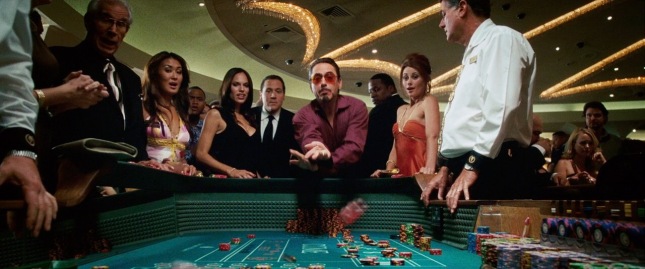 He plays craps when he should be getting a prestigious award and gives that award away to a stranger on a whim, because awards from society or friends don’t matter.
He plays craps when he should be getting a prestigious award and gives that award away to a stranger on a whim, because awards from society or friends don’t matter. His flight attendants bring him drinks and double as strippers. It’s all fun. And it is all pointless. His lack of care is what almost got him killed. If he had been more on his guard, more involved with his company, he would have figured out that Stane was selling their weapons to terrorists and kicked him out long ago. But he didn’t care. He was having fun. What did Yensin say to him? “Don’t let your life be a waste.” Most everyone puts Tony Stark as either an ENTP or J. You can look up their profiles here and here.
His flight attendants bring him drinks and double as strippers. It’s all fun. And it is all pointless. His lack of care is what almost got him killed. If he had been more on his guard, more involved with his company, he would have figured out that Stane was selling their weapons to terrorists and kicked him out long ago. But he didn’t care. He was having fun. What did Yensin say to him? “Don’t let your life be a waste.” Most everyone puts Tony Stark as either an ENTP or J. You can look up their profiles here and here.